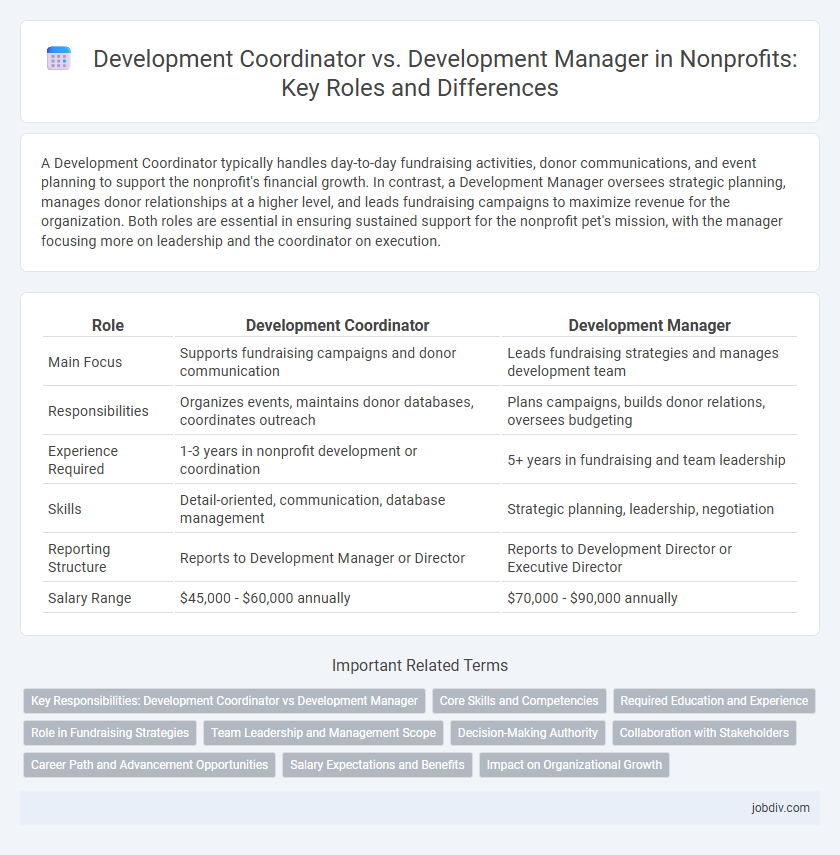A Development Coordinator typically handles day-to-day fundraising activities, donor communications, and event planning to support the nonprofit's financial growth. In contrast, a Development Manager oversees strategic planning, manages donor relationships at a higher level, and leads fundraising campaigns to maximize revenue for the organization. Both roles are essential in ensuring sustained support for the nonprofit pet's mission, with the manager focusing more on leadership and the coordinator on execution.
Table of Comparison
| Role | Development Coordinator | Development Manager |
|---|---|---|
| Main Focus | Supports fundraising campaigns and donor communication | Leads fundraising strategies and manages development team |
| Responsibilities | Organizes events, maintains donor databases, coordinates outreach | Plans campaigns, builds donor relations, oversees budgeting |
| Experience Required | 1-3 years in nonprofit development or coordination | 5+ years in fundraising and team leadership |
| Skills | Detail-oriented, communication, database management | Strategic planning, leadership, negotiation |
| Reporting Structure | Reports to Development Manager or Director | Reports to Development Director or Executive Director |
| Salary Range | $45,000 - $60,000 annually | $70,000 - $90,000 annually |
Key Responsibilities: Development Coordinator vs Development Manager
Development Coordinators handle day-to-day fundraising activities, donor communications, and event logistics, ensuring smooth execution of development plans. Development Managers focus on strategic planning, managing development teams, cultivating major donors, and overseeing large-scale fundraising campaigns to meet organizational goals. Both roles collaborate closely but differ in scope, with Coordinators emphasizing operational support and Managers driving long-term development strategies.
Core Skills and Competencies
Development Coordinators excel in project organization, donor database management, and event coordination, emphasizing strong communication and multitasking skills. Development Managers demonstrate advanced strategic planning, team leadership, and fundraising campaign oversight, requiring expertise in budget management and stakeholder engagement. Both roles prioritize relationship-building and data analysis but differ in leadership scope and decision-making responsibilities.
Required Education and Experience
Development Coordinators typically require a bachelor's degree in nonprofit management, communications, or a related field, along with 1-3 years of experience in fundraising or donor relations. Development Managers often need a bachelor's degree as well but usually demand 3-5 years of progressive experience in fundraising strategy, donor cultivation, and campaign management. Advanced certifications such as CFRE (Certified Fund Raising Executive) are more commonly expected for Development Managers to demonstrate expertise in nonprofit development leadership.
Role in Fundraising Strategies
A Development Coordinator primarily supports fundraising strategies by managing donor databases, coordinating events, and handling communications, ensuring efficient execution of campaigns. A Development Manager takes a leadership role by designing and implementing comprehensive fundraising plans, cultivating major donor relationships, and analyzing campaign performance to maximize revenue. Both roles are critical in nonprofit fundraising, with the coordinator focusing on operational tasks and the manager driving strategic growth.
Team Leadership and Management Scope
Development Coordinators primarily support fundraising activities by managing donor communications and coordinating events, operating under the guidance of higher-level staff. Development Managers hold broader responsibilities, including leading and mentoring the development team, designing fundraising strategies, and overseeing large-scale campaigns and budgets. The scope of management for Development Managers includes supervising multiple coordinators or specialists, ensuring alignment with organizational goals, and driving overall fundraising growth.
Decision-Making Authority
Development Coordinators typically handle routine tasks and support roles with limited decision-making authority, focusing on organizing events and managing donor communications under supervision. Development Managers hold greater responsibility, making strategic decisions on fundraising campaigns, budgeting, and resource allocation to meet organizational goals. Their higher decision-making authority directly influences the nonprofit's growth and donor engagement strategies.
Collaboration with Stakeholders
Development Coordinators facilitate communication between nonprofit teams and external stakeholders to ensure alignment on project goals and fundraising efforts. Development Managers lead strategic planning and foster long-term partnerships with donors, sponsors, and community leaders to maximize resource mobilization. Both roles are essential for effective stakeholder collaboration, yet Development Managers typically engage in higher-level negotiation and relationship management.
Career Path and Advancement Opportunities
Development Coordinators typically manage day-to-day fundraising activities and donor communications, gaining essential experience in nonprofit campaign execution and relationship building. Development Managers hold more strategic responsibilities, including planning major fundraising initiatives, overseeing teams, and analyzing fundraising data to drive growth. Career advancement often moves from Coordinator to Manager, with further progression to Director of Development or Chief Development Officer roles as leadership skills and fundraising impact increase.
Salary Expectations and Benefits
Development Coordinators typically earn lower salaries than Development Managers, with median annual earnings ranging from $45,000 to $60,000 compared to $65,000 to $90,000 for Managers in nonprofit organizations. Benefits for Development Managers often include comprehensive health insurance, retirement plans, and performance bonuses, reflecting their greater responsibilities and strategic roles. Coordinators may receive standard benefits like health coverage and paid time off but usually fewer incentives tied to organizational fundraising success.
Impact on Organizational Growth
A Development Coordinator supports fundraising efforts through detailed event planning, donor database management, and volunteer coordination, ensuring smooth execution of campaigns. A Development Manager leads strategic planning, builds donor relationships, and drives major gift initiatives, directly influencing revenue growth and sustainability. Both roles contribute to organizational growth, with the manager focusing on high-level strategy and the coordinator enhancing operational efficiency.
Development Coordinator vs Development Manager Infographic

 jobdiv.com
jobdiv.com